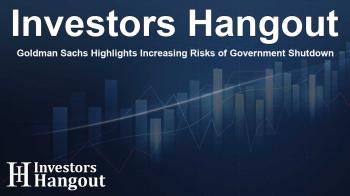Goldman Sachs Highlights Increasing Risks of Government Shutdown

Goldman Sachs Raises Alarm Over Government Shutdown Risks
Goldman Sachs has recently pointed out significant concerns regarding a potential shutdown of the U.S. government. This warning surfaced after the House of Representatives rejected a revised spending package that included a crucial debt limit suspension. The rejection, evident in a vote tally of 174 to 235, involved 38 Republicans opposed to the bill while only two Democrats offered their support.
Implications of the Failed Spending Package
The proposed bill aimed to suspend the debt limit until January 30, 2027. This crucial provision was highlighted by Goldman Sachs as the primary reason behind the bill's failure. Analysts at the bank noted, “The revised package that failed to pass included a 2-year debt limit suspension. While this was one of many changes from the prior bipartisan agreement, it was likely the primary reason the bill failed.” The impending expiration of current funding, scheduled for midnight on December 20, has further increased concerns regarding the potential for missing this critical deadline.
Challenges Ahead for Lawmakers
Goldman Sachs elucidated that unless Republican lawmakers who opposed the bill are willing to reassess their stance, the insistence from President-elect Donald Trump on including a debt-limit suspension could pose challenges in avoiding a government shutdown. Despite this setback, Goldman Sachs maintains a cautiously optimistic outlook, indicating that Congress has successfully passed last-minute extensions previously. They believe that the upcoming recess might instigate lawmakers to convene and forge a deal promptly.
Possible Avenues for Resolution
To mitigate the looming threat of a shutdown, Goldman Sachs outlined two potential paths. Congress might opt to pass a short-term spending extension, thus deferring the debt-limit debate to a later date. Alternatively, Republicans could engage in discussions with Democrats to secure a debt-limit increase, potentially linked to new policy concessions. While the debt limit is set to technically return on January 2, 2025, Goldman Sachs estimates that the Treasury will have adequate resources to fulfill its obligations until the third quarter of the next year.
Conclusion
Goldman Sachs remains hopeful, articulating, “We continue to think a protracted shutdown will be avoided.” As the situation develops, the collaboration among lawmakers and a willingness to negotiate could prove essential in steering the government clear of a shutdown scenario.
Frequently Asked Questions
What caused the concern over a government shutdown?
The concern arose following the House's rejection of a revised spending package, which included a vital debt limit suspension.
What was the outcome of the vote on the spending bill?
The revised spending package was rejected with a vote of 174-235, indicating a significant division among lawmakers.
How does Goldman Sachs view the likelihood of a government shutdown?
Goldman Sachs expresses cautious optimism, suggesting that a prolonged shutdown is unlikely.
What are the two potential paths forward suggested by Goldman Sachs?
Congress could either pass a short-term spending extension or negotiate with Democrats for a debt-limit increase.
When will the debt limit technically be reinstated?
The debt limit will be reinstated on January 2, 2025, although the Treasury is expected to manage until the third quarter of next year.
About Investors Hangout
Investors Hangout is a leading online stock forum for financial discussion and learning, offering a wide range of free tools and resources. It draws in traders of all levels, who exchange market knowledge, investigate trading tactics, and keep an eye on industry developments in real time. Featuring financial articles, stock message boards, quotes, charts, company profiles, and live news updates. Through cooperative learning and a wealth of informational resources, it helps users from novices creating their first portfolios to experts honing their techniques. Join Investors Hangout today: https://investorshangout.com/
Disclaimer: The content of this article is solely for general informational purposes only; it does not represent legal, financial, or investment advice. Investors Hangout does not offer financial advice; the author is not a licensed financial advisor. Consult a qualified advisor before making any financial or investment decisions based on this article. The author's interpretation of publicly available data shapes the opinions presented here; as a result, they should not be taken as advice to purchase, sell, or hold any securities mentioned or any other investments. The author does not guarantee the accuracy, completeness, or timeliness of any material, providing it "as is." Information and market conditions may change; past performance is not indicative of future outcomes. If any of the material offered here is inaccurate, please contact us for corrections.
